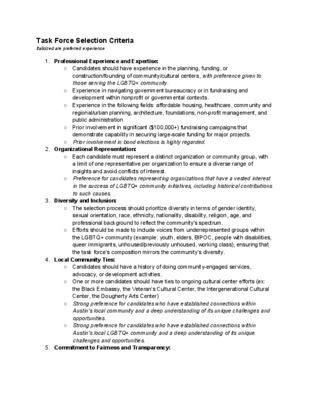Item 6: Task Force Candidate Recommendation Criteria — original pdf
Backup

Task Force Selection Criteria Italicized are preferred experience 1. Professional Experience and Expertise: ○ Candidates should have experience in the planning, funding, or construction/founding of community/cultural centers, with preference given to those serving the LGBTQ+ community. ○ Experience in navigating government bureaucracy or in fundraising and development within nonprofit or governmental contexts. ○ Experience in the following fields: affordable housing, healthcare, community and regional/urban planning, architecture, foundations, non-profit management, and public administration ○ Prior involvement in significant ($100,000+) fundraising campaigns that demonstrate capability in securing large-scale funding for major projects. ○ Prior involvement in bond elections is highly regarded. 2. Organizational Representation: ○ Each candidate must represent a distinct organization or community group, with a limit of one representative per organization to ensure a diverse range of insights and avoid conflicts of interest. ○ Preference for candidates representing organizations that have a vested interest in the success of LGBTQ+ community initiatives, including historical contributions to such causes. 3. Diversity and Inclusion: ○ The selection process should prioritize diversity in terms of gender identity, sexual orientation, race, ethnicity, nationality, disability, religion, age, and professional background to reflect the community's spectrum. ○ Efforts should be made to include voices from underrepresented groups within the LGBTQ+ community (example: youth, elders, BIPOC, people with disabilities, queer immigrants, unhoused/previously unhoused, working class), ensuring that the task force’s composition mirrors the community’s diversity. 4. Local Community Ties: ○ Candidates should have a history of doing community-engaged services, advocacy, or development activities. ○ One or more candidates should have ties to ongoing cultural center efforts (ex: the Black Embassy, the Veteran’s Cultural Center, the Intergenerational Cultural Center, the Dougherty Arts Center) ○ Strong preference for candidates who have established connections within Austin's local community and a deep understanding of its unique challenges and opportunities. ○ Strong preference for candidates who have established connections within Austin's local LGBTQ+ community and a deep understanding of its unique challenges and opportunities. 5. Commitment to Fairness and Transparency: ○ Candidates must demonstrate a commitment to fairness, transparency, and inclusivity in both their professional conduct and their approach to the feasibility study. ○ They should be willing to engage in open dialogues, consider multiple perspectives, work democratically, and actively resolve conflict in a healthy manner. ○ Candidates will agree to prioritize community needs, with particular attention to the most vulnerable parts of the LGBTQ+ community. 6. Conflict of Interest Policy: ○ All candidates must disclose any potential conflicts of interest regarding their personal, professional, or financial connections that might affect their impartiality or decision-making. ○ Candidates are not eligible and must disclose any financial interest for themselves or their family in for-profit development. 7. Advisory Role Limitation: ○ Candidates are not required to have operational knowledge of running a cultural center but should focus on various aspects of the feasibility phase with strong focus on the financial aspects of the project. 8. Commitment to the Task Force: 9. Candidates must be willing to dedicate the necessary time and effort to attend at least monthly meetings, participate in discussions, adequately prepare outside of meetings, and contribute to the production of a comprehensive feasibility report.